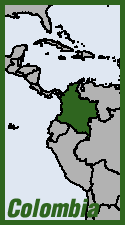 Colombians made history March 8, as tens of thousands took to the streets in cities and towns nationwide—joined by Colombian ex-pats and immigrants in the US, Canada, Europe and elsewhere—to show their support for peace talks between the government and FARC guerillas. The "March for Life" was organized by Bogotá’s ex-mayor Antanas Mockus and was embraced by President Juan Manuel Santos, who joined the march in the capital. Since then, there have been some encouraging signs that the country’s multi-decade armed conflict is really coming to an end. (EuroNews, March 9; AP, Colombia Reports, March 8)
Colombians made history March 8, as tens of thousands took to the streets in cities and towns nationwide—joined by Colombian ex-pats and immigrants in the US, Canada, Europe and elsewhere—to show their support for peace talks between the government and FARC guerillas. The "March for Life" was organized by Bogotá’s ex-mayor Antanas Mockus and was embraced by President Juan Manuel Santos, who joined the march in the capital. Since then, there have been some encouraging signs that the country’s multi-decade armed conflict is really coming to an end. (EuroNews, March 9; AP, Colombia Reports, March 8)
Up till now, the government has not responded to a unilateral FARC truce, continuing to carry out operations against the guerillas despite ongoing peace talks in Havana. But days after the March for Life, the government agreed to suspend bombing raids on FARC strongholds—for at least a month. (BBC News, March 11)
The government and FARC also reached terms over a program to remove landmines from the Colombian countryside. Landmines continue to claim scores of casualties in Colombia each year. (Colombia Reports, March 24)
But Colombia’s hardline ex-president Alvaro Uribe continued his bitter campaign against the peace effort. He griped in a press release that "the suspension of air strikes against the FARC is clearing the way for the narco-guerrilla to continue committing crimes and causing intimidation." (Colombia Reports, March 11)
Meanwhile, Colombia's second guerilla group, the National Liberation Army (ELN), issued a statement saying the United States should take responsibility for its role in Colombia’s war. In response to the news that Washington is sending a special envoy to the talks with the FARC, the ELN said: "We welcome this decision by the US, but we believe that their role should not remain to be that of an innocent observer, or an illustrious adviser, or a happy composer, and much less the impartial judge." Instead, the ELN said the US should take part in the talks "as directly responsible for the war and its disasters" and "make commitments to rebuild commitments." (Colombia Reports, March 9)
Peace talks have not yet seen a de-escalation in Colombia’s conflict, as the government has still not fully responded to the FARC truce, and the ELN remains in arms—as do outlawed paramilitary groups. A new Red Cross report finds that violations of international humanitarian law in Colombia actually increased by an alarming 41% in 2014. According to the report, 814 apparent breaches of International Humanitarian Law (IHL) were reported in 2014, an increase of 258 over 2013. "While peace talks between FARC guerrillas and the government were progressing in Havana, the armed conflict and other forms of violence continued to challenge Colombians," the report stated. (Colombia Reports, March 14)
Cross-post to High Times







Recent comments
1 week 20 hours ago
4 weeks 6 days ago
8 weeks 6 days ago
9 weeks 4 days ago
19 weeks 4 days ago
23 weeks 5 days ago
24 weeks 5 days ago
24 weeks 5 days ago
45 weeks 6 days ago
50 weeks 7 hours ago